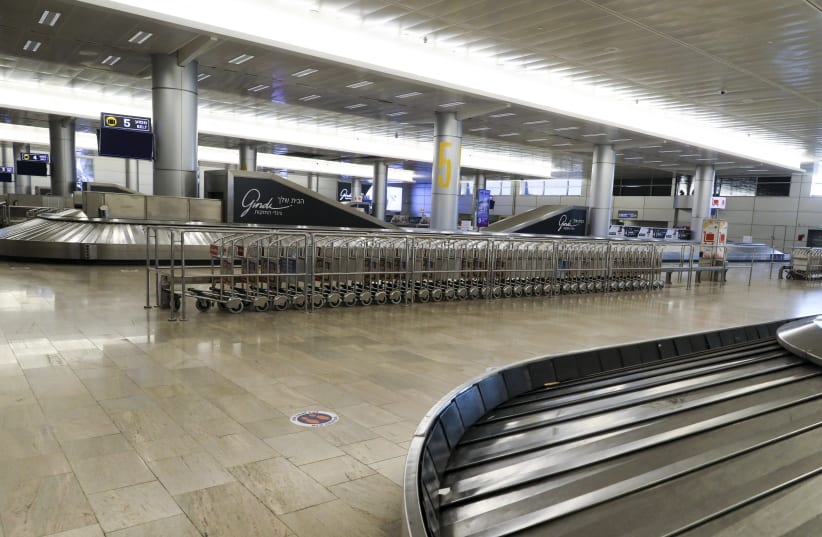Israeli airline companies are preparing to operate a massive airlift for Israelis currently abroad and in a hurry to return to Israel, following Monday’s decision by the coronavirus cabinet to impose mandatory quarantine in hotels.
Monday’s coronavirus decisions go above and beyond those made the day before, which closed the skies to any foreigner traveling from Britain, Denmark or South Africa, and required hotel isolation for any Israelis returning from those places.
At the cabinet meeting on Monday, Netanyahu raised concerns that the new strain of the virus was spreading throughout the world and that it was still unclear what the consequences are of the new strain, which is 70% more transmissible than the original virus, British Prime Minister Boris Johnson announced on Saturday.
Coronavirus commissioner Prof. Nachman Ash told KAN News on Monday that while the strain has still not been detected in Israel, the Health Ministry is checking to see if the rise in infection rates is connected to the new strain.
Dr. Sharon Alroy-Preis, head of public health services at the Health Ministry, painted a frightening picture of how widespread the coronavirus mutation might be, in a meeting of the Constitution, Law and Justice Committee on Tuesday morning.
She said that it was important to keep in mind that while the mutation has been discovered in England, South Africa and Denmark, these are countries that carry out tests on the genetic makeup of the virus, but most countries do not do such tests. The mutation had also been found in Italy and Holland, she said, but it could be everywhere – and could also develop spontaneously in Israel.
This week, she said, when the results of more testing are revealed, it would be possible to say for sure whether the vaccine was effective against the mutation. She also said that an exceptions committee was in place to hear from people who cannot quarantine in hotels because of medical or other extenuating circumstances. PROF. HAGAI LEVINE gave a different reading of the crisis, saying: “We can’t make everyone go to hotels without an epidemiological basis,” and that more enforcement of home quarantine was needed.Alroy-Preis said that while it was “nice to throw out slogans about improving home quarantine,” research shows that many do not observe home quarantine rules. The committee also heard from medical experts including Alroy-Preis and officials from the Homefront Command regarding conditions in the quarantine hotels that opened earlier this week, following complaints of inadequate food and medical supplies, and poor conduct on the part of enforcement officials toward those placed in the hotels.
Homefront command officials said that by Thursday night there would be adequate food and supplies in the quarantine hotels.
Foreigners, including those with existing travel permits, will not be able to enter Israel beginning December 23, after the government approved a decision Monday evening made earlier by the coronavirus cabinet.
Some 3,594 new cases of the novel coronavirus were reported on Monday, with 4.2% of tests returning positive, according to a Tuesday morning update by the Health Ministry.
Of all those who are infected, 472 are in serious condition and 119 are on ventilators. The death toll stands at 3,111.
"We hurried out of the lockdown," Health Ministry Director-General Hezi Levy told KAN news on Tuesday. "If it is not imposed again, it will lead us to a heavy load in the hospitals. I do not rule out the possibility that we will need an immediate lockdown."
Alroy-Preis told KAN news that they had "raised a flag to the cabinet two weeks ago and said that if no action is taken, we will reach the places of the second wave – and now we are over 3,000 verified cases. We identify the places of infection and act: First of all close the borders."Almost 30,000 people have been vaccinated against the virus in the past two days, Health Minister Yuli Edelstein announced on Tuesday, calling on the target populations to go and get vaccinated. As of Sunday evening, over 200,000 appointments had been made by seniors and medical staff for vaccinations.
